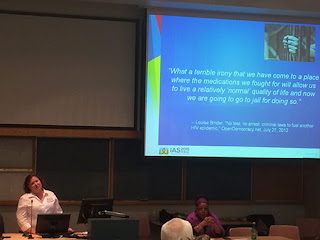Prison time for HIV? It’s possible in Veracruz
El Daily Post, August 6th 2015
New legislation passed by the Veracruz state Congress calls for up to five years in prison for “willfully” infecting another with HIV, which can lead to AIDS. The measure is fraught with legal, medical, public health and human rights problems, but supporters insist it will help protect vulnerable women.
The Veracruz state Congress has unanimously approved legislation that calls for prison time for anyone who intentionally infects another person with the HIV virus or other sexually transmitted diseases.
The amendment to the state penal code makes Veracruz the second Mexican state (after Guerrero) to criminalize the sexual transmission of illnesses. Another 11 states have sanctions in the books for infecting others with “venereal diseases,” a term and concept no longer used in the medical community.
But Veracruz has stipulated a more severe punishment than the other states — from six months to five years in prison. Guerrero also has a maximum of five years, but it’s minimum is three months.
The bill was promoted by Dep. Mónica Robles Barajas, a member of the Green Party, which is allied with the ruling Institutional Revolutionary Party. She said the legislation is aimed at protecting women who can be infected by their husbands.
“It’s hard for a woman to tell her husband to use a condom,” she said in an interview with the Spanish-language online news site Animal Político.
The legislation, however, raises serious questions, both legal and medical, as well as concerns about human rights.
The most obvious problem is the notion of “intentional” infection. Robles emphasizes that the bill is based on a “willful” passing of the virus, which she defines as a carrier having sexual relations when he or she is aware of his or her HIV infection.
But the notion of intentionality in such cases is a complicated one for prosecutors, legal experts say. The he-said/she-said factor can be a sticking point, according to Luis González Plascencia, a former head of the Mexico City human rights commission, with the accusation likely to be based on one person’s testimony.
“There could be ways to show through testimony that there was an express intention to infect,” González told Animal Político. “But that’s always going to be circumstantial.”
A likely abuse of the law, he said, is attempted revenge or blackmail. An angry spouse or other partner can, with a simple declaration, create a legal nightmare.
Even if the issue of intentionality can be overcome, the very notion of criminalizing HIV infection is controversial. AIDs and human rights experts are against it.
One of them is Ricardo Hernández Forcada, who directs the HIV-AIDS program at Mexico’s National Human Rights Commission (CNDH). International experience, he says, indicates that punitive policies accomplish little besides government intrusion into private life. (Eastern Europe and Southeast Asia are regions where laws similar to the new one in Veracurz have existed.)
A Veracruz non-governmental organization called the Multisectoral HIV/AIDS Group issued a communiqué in response to the new legislation, declaring, “Scientific evidence shows that legislation and punishment do not prevent new infections, nor do they reduce female vulnerability. Instead, they negatively affect public health as well as human rights.”
González concurred. “The only thing that’s going to happen is that there will be another crime in the penal code that won’t accomplish anything except generate fear,” he said.
The Multisectoral Group also pointed out a disconnect between the law and medical science. It’s virtually impossible, the group says, to determine with certainty who infected whom with a sexually transmitted disease.
“Phylogenetic analyses alone cannot determine the relationship between two HIV samples,” the group said in its release. “They cannot establish the origin of an infection beyond a reasonable doubt, or how it occurred, or when it occurred.”
Robles, for her part, objects to the notion that the legislation criminalizes HIV carriers, insisting that the target is the intentional infection of another through sex. She emphasized that the aim of the new law is to protect women, who are often in a vulnerable situation.
“It’s directed much more at protecting women than homosexual groups,” she said. “There is a high incidence among women because there is no awareness of the risk they run.”
Opponents, however, see the new law as a step backward for men and women, and for public health in general, insisting that penalization comes at the expense of prevention.
“Knowing that they could be at risk of prosecution, people won’t get tested,” the CNDH’s Hernández Forcada said. “These measures inhibit people’s will to know their diagnosis.”



